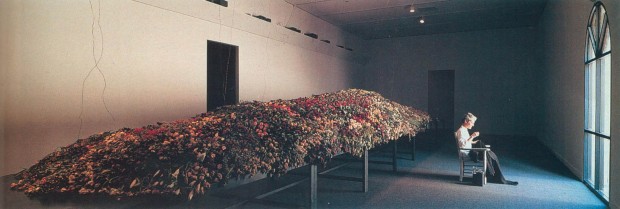One of my favorite writers, the poet Donald Hall, speaks often of gardens and nature in his work, recounting his farmstock lineage, his beloved dead wife’s care of her New England garden, and his own poetic struggles with the tending of Nature. In his book Life Work Hall writes:
My grandfather was the model for my adult manhood… It pleases me and amuses me to compare the way I work to the way Wesley Wells did. Comparisons need distance to be useful, and the work is different enough, farmer and writer, but each of us worked or works the whole day at diverse tasks, making an unpredictable living by producing a variety of products: milk, honey, eggs, wood, chicken-flesh, sheep-flesh, calf-flesh, maple syrup, wood for burning and logs for sawing, ice; poems, essays, children’s books, textbooks, book reviews; essays on New Hampshire, baseball, poetry; short stories, plays and an essay-book on work.
Gardens often serve as pregnant corralaries to the artistic craft, artists and writers often throwing themselves into the nurturing of land as a vehicle for thought — a quiet space for the intellect and imagination to grow alongside the spinach and roses. Nearly every artist I know, come to think of it, has a space for growing things. Most of them are quite good at it too, something to do with that urge to create, or at least participate in creation. Growing things, for artists, seems a helpless need, but it’s one that is, like art-making itself, rife with defeat.
This morning, when I woke up crabby only to realize that we were out of coffee, I sullenly retreated to the backyard, as is my way, protecting my family from the beast-in-me, and looking for solace in our patch of urban nature. Solace it was not. Instead, I threw myself into the wild crunch of the killing- field that our yard has become in the last month under the thermal menace of the unrelenting sun. Nearly everything I’ve tended and nurtured for the past four months has met, or is on it’s way to meeting, an early end.
Grass — brown and bone dry. A tree that was thinking about dying finally went all in. Dead. Its leaves blow around the yard, confused about the seasons. It’s likely to fall on our neighbor’s house, and she is probably well-aware of it, though never mentions it because we’ve never actually met because she’s shy (rumor has it) about being a high class call-girl and so keeps to herself entirely (when she’s at home anyway).
And then there are the zinnias which we grew from seeds and always disappointed me because we never properly turned the soil or pampered it enough or whatnot and so the flowers grew into these snarly schizophrenic things, not sure to grow upwards or downwards, and so occupy a square foot spot of a rocky patch of bad dirt in the glaring sun, all day, not knowing whether to live or die (up? down?) and just endure, existentially, in their unlovely unsurety, drinking water when it’s given them enough to survive.
The tomato plants? I didn’t choose to grow them. They randomly sprouted up in the summer squash patch and must have been spawned from rogue tomato seeds that stowed away in the squash seed packet, so that suddenly I had ten tomato plants growing in the garden without permission, but growing and alive, so I couldn’t just pull them out and throw them away. So we moved them to their own patch in the yard, a whole new patch carved out of the then soft, mildly nutritious dirt, because those tomatoes felt like destiny showing up like that, you know? This morning, I went to the back fence to see said tomato plants, our miracle yard-children, only to discover that three of them had fallen over from the roots, the earth around their bases dry as sand on the mesas — kaput, made prostrate like victims in a saloon gunfight. Bang. Dead. Simple as that, never mind that I’d watered, weeded and fertilized.
And so it was, then, that the Italian sunflowers that were as tall as me suddenly offended me with their gangly arms all out-reaching and top-heavy with old, mangy heads at each end, bobbling, taunting. “Ugly as sin, you are, Sunflower” I decided right then and there, making it the scapegoat, and pulled the whole damn, heavy Medusa out of the ground, the dirt crumbling, powered and fecund-less.
I stood there, uncaffienated and slump shouldered, amidst my felled and dwindling botanicals for which I had employed all manner of artful tenderness, feeling betrayed by nature and nurture, and left with a bit of land on which only the things with sharp points or prickles – cacti and a few succulents — have the proper, stalwart constitution to live through the heat and so flatter me by their survival.
Why the hell had I gone out there into the yard anyway? Outside (art) — it’s nothing but masochism.



